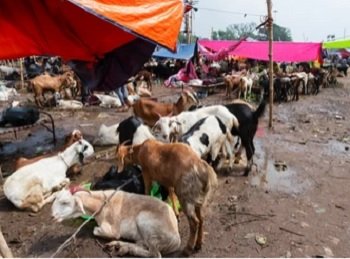NITI Aayog, Gujarat University sign SoI to promote agriculture
A Statement of Intent (SoI) was signed between NITI Aayog and Gujarat University in the presence of NITI Aayog Vice-Chairman Dr Rajiv Kumar. NITI Aayog Senior Adviser Dr Neelam Patel and Indian Institute of Sustainability, Gujarat University, Director Sudhanshu Jangir signed the SoI on behalf of their institutions. An MBA programme in agripreneurship and value chain management was also launched during the event by Dr Rajiv Kumar.
The SoI focuses on technical collaboration between the two institutions to strengthen knowledge-sharing and policy development in India. The objective is to encourage and promote cooperation in the field of agriculture and allied sectors. The SoI is expected to give a thrust to India’s efforts towards achieving the Sustainable Development Goals.
“We welcome the partnership with Gujarat University and the Indian Institute of Sustainability (IIS) and look forward to mutual collaboration in joint studies, research and study programmes; policy design, analysis and advocacy; and implementation of the SDGs. IIS has also proposed to open a Centre of Agripreneurship and Natural Farming with the support of NITI Aayog. At our end, NITI will extend all possible technical expertise and advice, including collaborations with agripreneurs and exposure to policymaking, to IIS,” said NITI Aayog Vice-Chairman Dr Rajiv Kumar.
The parties will conduct capacity-building programmes on farm sector development, agripreneurship, natural farming, climate change, etc. The two institutions will also undertake activities to build awareness around the best practices of the agriculture value chain management, marketing methods, conservation of natural resources, climate change and other identified areas to improve the generation and uptake of evidence in policymaking.
Offered by IIS, the MBA programme in agripreneurship and value chain management is a uniquely designed course that will provide global exposure to students in understanding the agriculture ecosystem. The programme is a step towards Aatmanirbhar Bharat and seeks to engage entrepreneurs and value chain professionals in the agriculture sector.
“IIS’s MBA in agripreneurship and value chain management will empower agribusiness leaders, agriculture entrepreneurs, and value chain experts with the necessary skills, knowledge, exposure and attitude. It will foster an understanding of agribusiness, agro-based enterprises, rural and allied sectors. This is an excellent initiative by Gujarat University. The course is much-needed to develop an appropriate ecosystem for natural farming. We assure full support to Indian Institute of Sustainability and Gujarat University,” said NITI Aayog Vice-Chairman Dr Rajiv Kumar.
Gujarat Education Minister Bhupendra Sinh Chudasama added, “Gujarat has been at the forefront of education and agriculture. Globalisation, policy reforms, and consumer awareness have brought about structural changes in Indian agriculture. There is a significant demand for agriculture entrepreneurs and value-chain management professionals. IIS’s MBA course will create enormous opportunities for students and nurture an entrepreneurial spirit to serve the agri-food industry and rural development. We welcome the partnership with NITI Aayog, which will open new frontiers in Indian agriculture.”
Various dignitaries participated in the event, including Gujarat University Vice-Chancellor Dr Himanshu Pandya and Pro Vice-Chancellor Dr Jagadish Bhavsar, and GUSEC CEO Rahul Bhagchandani.
NITI Aayog, Gujarat University sign SoI to














